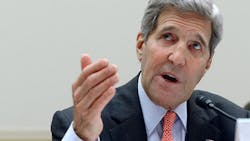HANOI, Vietnam - Countries negotiating a vast free-trade pact will hopefully secure a deal by the end of this year, U.S. Secretary of State John Kerry said on Friday in Hanoi.
Kerry said the 12 countries negotiating the Trans-Pacific Partnership (TPP) -- including the U.S., Japan and Vietnam -- had made good "progress" during the last round of talks on the Hawaiian island of Maui last week.
"We are hoping very much that over the course of a couple of months, before the end of the year, [the] TPP can be completed," he told reporters after a meeting with Vietnam's Foreign Minister Pham Binh Minh in Hanoi.
Concerns over labor rights -- Vietnam does not allow independent trade unions -- remain a sticking point for the communist country, but most other issues with Hanoi have now been resolved, Kerry said at a joint press briefing.
Other subjects still being negotiated include Japan's automobile market, as well as Canada's and New Zealand's reticence to open up their dairy sector.
"We will do everything possible to work through these differences," Kerry said.
The top U.S. diplomat has previously praised the TPP -- which will cover nearly 40% of the world's economy -- as an agreement that would reap benefits beyond economic growth.
The pact, which excludes China, has been eight years in the making and is vaunted as part of Obama's "rebalance" towards Asia in the face of an increasingly assertive Beijing.
Its aims include raising labor and environmental standards, protecting intellectual property and deterring corruption, but critics say the TPP is more about protectionism and corporate benefits than free trade and development.
The TPP countries -- Australia, Brunei, Canada, Chile, Japan, Malaysia, Mexico, New Zealand, Peru, Singapore, Vietnam and the U.S. -- have also been accused of carrying out their negotiations in intense secrecy.
Observers say the delay in securing the deal in Maui last week complicates U.S. President Barack Obama's plans to complete the accord this year with a risk of it becoming dragged into the 2016 presidential election debate.
Copyright Agence France-Presse, 2015
About the Author
Agence France-Presse
Copyright Agence France-Presse, 2002-2025. AFP text, photos, graphics and logos shall not be reproduced, published, broadcast, rewritten for broadcast or publication or redistributed directly or indirectly in any medium. AFP shall not be held liable for any delays, inaccuracies, errors or omissions in any AFP content, or for any actions taken in consequence.
